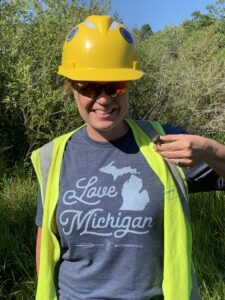
David A. Mifsud President
David Mifsud “Turtle Dave” is a certified professional wetland scientist through the International Society of Wetland Scientists, a certified professional ecologist through the Ecological Society of America, and Certified professional Wildlife Biologist through the Wildlife Society. He has worked for over 30 years in wildlife biology, wetland ecology, and habitat conservation and management, with an emphasis on herpetofauna. He is an authority in Michigan on conservation and management of amphibians and reptiles. David is Co-chair of the State of Michigan Amphibian and Reptile Technical Advisory board. He also coordinates the Michigan Herpetological Atlas project. He serves as an expert on Great Lakes turtles for the International Union for Conservation of Nature (IUCN) Tortoise and Freshwater Turtle Specialist Group. He has also served on the board of the North Central Chapter of the Society of Wetland Scientists and as a co-chair for the Michigan Wetland Association Research and Science Committee. Mifsud is the author of the Amphibian & Reptile Best Management Practices for Michigan and co-author of the revised edition of Amphibians and Reptiles of the Great Lakes Region.
David has overseen and designed numerous projects and studies focused on the inventory, monitoring, conservation and management, rescue and translocation, and headstarting of amphibians and reptiles in Michigan for a variety of partners including non-profit, private, and governmental agencies. Mifsud also works internationally helping to protect and conserve turtles and tortoises in Southeast Asia and Africa. He is an authority of African hinge-backed Tortoises and in 2014 he co-authored the Kinixys Conservation Blueprint.

James Harding Vice President
James H. Harding retired in January 2020 from the Department of Integrative Biology and the MSU Museum at Michigan State University’s, where he was an instructor and natural history outreach specialist. Jim received his bachelor’s and master’s degrees from the Department of Fisheries and Wildlife at Michigan State University. He taught the MSU undergraduate course “Biology of Reptiles and Amphibians” from 1997 through 2019. Jim is a research herpetologist specializing in the conservation biology of turtles. He has conducted long-term research on the biology of the Wood Turtle in northern Michigan, and also conducts field studies on the Blanding’s Turtle and the Eastern Box Turtle. He is also an experienced interpretive naturalist and spent nine years as a naturalist at the Cranbrook Institute of Science in Bloomfield Hills, Michigan. He is the author or co-author of four popular books on reptiles and amphibians (listed below), and has written many articles for academic journals, newspapers and magazines. His expertise and advice is often sought by natural resource agencies and private organizations in their management and conservation efforts to protect Michigan’s reptiles and amphibians. Jim presently co-chairs the Michigan’s Technical Advisory Committee on Amphibians and Reptiles, which reports to the Michigan Department of Natural Resources.
Books:
Michigan Snakes (A field Guide and Pocket Reference). 1989. Holman, J.A., J.H. Harding, M.M. Hensley, and G.R. Dudderar.[Revised 2006]. Michigan State University, Cooperative Extension Service, Pub. E-2000. 74 pp.
Michigan Turtles and Lizards. Harding, J.H. and J.A. Holman, 2014. Michigan State University, Cooperative Extension Service and MSU Museum, Extension Bull. E-2234. 88 pp.
Michigan Frogs, Toads, and Salamanders, Harding, J.H. and J.A. Holman. 2015. Michigan State University, Cooperative Extension Service and MSU Museum. Extension Bull. E-2350. 128 pp.
Amphibians and Reptiles of the Great Lakes Region (Revised Ed.) 2017. Harding, J.H. and David A. Mifsud. University of Michigan Press. 392 pp.

Melissa Sano Treasurer/Secretary
Melissa (Missi) has worked in the animal health and conservation field for over 25 years working with a variety of animals in the veterinary, zoological, and private sector. At Potter Park Zoo she served as lead Amphibian and Reptile Keeper until 2020 when she left to pursue new professional opportunities. She worked in the Biomedical industry as a Supervisor offering her many opportunities for connections and professional growth. Melissa has been a part of HRM’s team since 2018. She is HRM’s Senior Manager and Human Resources Specialist. She assists with general operations, animals care including headstarted turtles, and field surveys. She has a Bachelors in Zoology from Michigan State University and a Masters in Conservation Biology from Prescott University. Her background, incredible work ethic, and attention to detail has been instrumental in helping MARC grow and develop as an organization.

Chris Woodley Board Member at Large
Chris is an associate professor and the Science Department Chair at Baker College. He has helped to administer the Herp Atlas database since 2010, and also has experience working with captive and wild herpetofauna as a field biologist with HRM and as a zookeeper. His current research is focused on understanding the lived experience of herpers to better inform the recruitment and training of citizen science volunteers.

Autumn Baker Board Member at Large
Autumn Baker is the Development & Donor Relations Coordinator for Chippewa Watershed Conservancy. Her lifelong interest in herpetology has led her to seek out roles where she can engage and educate the public regarding amphibians and reptiles while encouraging the future generation of herp enthusiasts. She also serves as Social Media Manager for Herpetological Resource & Management, LLC, Michigan Amphibian & Reptile Conservancy, and Michigan Herp Atlas. When not working in those positions, she volunteers for the Michigan Vernal Pool Patrol monitoring vernal pools, assisting in the Little Forks Conservancy stream sampling program, and the Michigan Herp Atlas as an administrator..

Lindsey Johnson Board Member at Large
Since 2006, Lindsey Johnson has worked as an environmental engineer for Consumers Energy. Michigan State University is the source of both her bachelor’s and master’s degrees. In addition to saving thousands of amphibians and reptiles through Consumers Energy projects, Lindsey has been a steadfast supporter of headstart initiatives and has actively promoted them through her organization. In order to protect the local animals and ecosystem, she strives to make sure environmental needs are not just satisfied, but also exceeded!
